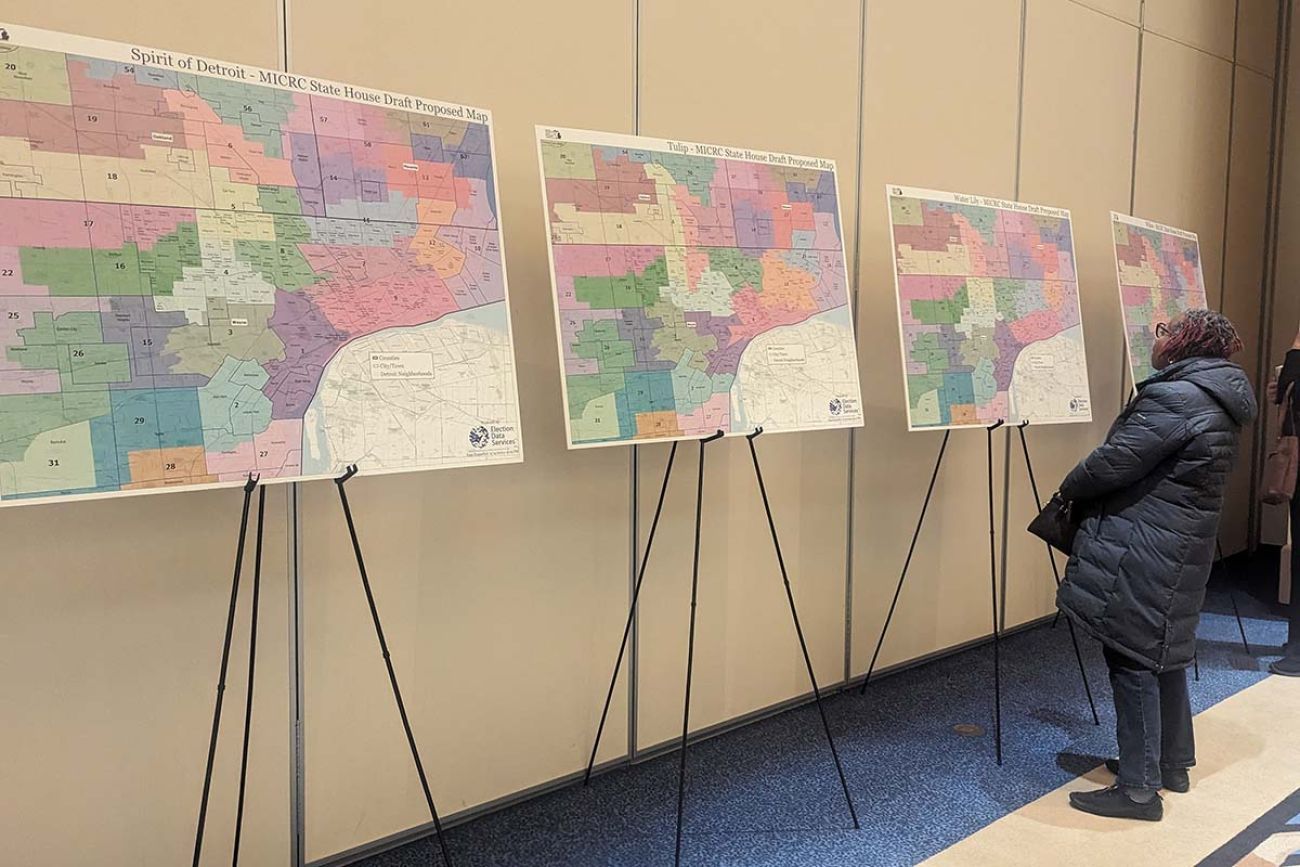Michigan redistricting: Opponents argue new Detroit maps fall short

- Detroit-area voters challenging district maps argue commission’s redraw should be scrapped
- Friday filing says maps are an ‘improvement’ but still fall short of fixing issues
- One concern is that incumbent lawmakers are drawn into separate districts, a factor commissioners say they didn’t consider
Detroit-area residents challenging Michigan’s legislative maps aren’t happy with revisions the state’s redistricting commission came up with, slamming the group’s latest map as an “incumbency protection plan” that would continue to disenfranchise Black residents.
In a Friday evening filing, attorneys for metro Detroit voters who successfully sued the Michigan Independent Citizens Redistricting Commission said that while the new House map approved last month is an improvement, it unfairly gives incumbent lawmakers an advantage by drawing them into a map where none of them have to run against each other.
“Because of the immense advantage that incumbents enjoy, that virtually ensures that the results of the 2022 election — conducted using the invalidated House map — will essentially be locked in for the foreseeable future,” the filing reads.
Related:
- Michigan redistricting: Mapmakers finalize new metro Detroit House map
- Analysis: Redistricting maps give GOP fighting chance, boost Detroit’s clout
- U.S. Supreme Court to redistricting commission: Keep redrawing Detroit maps
Edward Woods, the commission’s executive director, said the map chosen by commissioners was the overwhelming favorite of public commenters and likened the plaintiffs’ complaints to an “ongoing public strategy to preserve their and their allies’ self-interests at the expense of Michigan residents.”
“The plaintiffs’ assertions of favoring incumbents, race-based line drawing, and minimizing Black opportunities without evidence runs counter to the live streaming of the Commission’s meetings,” he said Monday afternoon.
Commissioners began revisiting legislative district boundaries in Southeast Michigan after a federal three-judge panel ordered them to redraw seven House and six Senate districts, finding the group improperly drew the districts with race in mind.
The map submitted for court review, “Motown Sound FC E1,” diverges from the current state House map, largely adhering to county and municipal boundaries and boosting Black majorities in areas where critics said commissioners kept the Black voting-age population artificially low.
During the process, several commissioners said they paid no attention to where sitting lawmakers lived while they worked to comply with the court order.
“The districts, as far as I know, do not favor or disfavor an incumbent or potential candidate,” Commissioner Steve Lett, one of the commission’s politically independent members, said during deliberations.
Some of the proposed maps considered would have created instances where incumbent lawmakers would have to move or run against a fellow lawmaker, but the map approved by commissioners did not — an outcome plaintiffs argued was statistically rare.
Unlike the current state House map, districts approved by the commission Wednesday largely adhere to county and municipal boundaries, with only four Detroit districts extending out of Wayne County into Oakland and Macomb counties.
Timeline for redrawing maps
A federal three-judge panel in December ordered the Michigan Independent Citizens Redistricting Commission to redraw 13 House and Senate districts in the metro Detroit area.
Here’s the timeline the court set for completing that process and 2024 election dates.
- March 15: Court-appointed expert due to submit review of the commission’s work
- March 29: Court date for implementing new House maps. Judges left open the option of using a plan drawn by a court-appointed expert if they deem the commission’s work insufficient
- April 12: Court to reconvene to determine next steps on redrawing state Senate maps
- April 23: Filing deadline for candidates in new state House districts
- Aug. 6: Michigan primary election
- Nov. 5: Michigan general election
Currently, nine districts containing portions of Detroit extend well into the northern suburbs. Detroiters contended those districts diluted their vote by extending from the city far into suburbs.
The proposed drafts remedy that by generally clustering districts in the city, creating the possibility of more Detroit residents and Black elected officials in the Legislature in future sessions.
Still, the commission’s challengers said some district boundaries weren’t changed enough to adequately fix issues with the current maps, citing concerns with pairing Eastpointe and portions of Detroit with St. Clair Shores in the 10th district and Harper Woods with the Grosse Pointes in the 12th District.
“That strategy continues to perpetuate racial discrimination, dilute Black voting power, and defy communities of interest,” the plaintiffs’ filing reads.
Should the court reject the commission’s redraw, judges left open the fallback option of using a different map drawn by a court-appointed expert. A separate court-appointed expert is due to submit a review of the commission’s work on March 15.
The commission still maintains that the original maps met constitutional muster, and are appealing the lower court’s order. But the Supreme Court denied a request to pause the remapping process, meaning a new map could be in place before justices rule on the validity of the old ones.
A final decision on the state House map is expected by March 29, a few weeks before April 23 candidate filing deadlines in the 2024 election cycle. The three-judge panel will reconvene in April to consider a plan for new state Senate districts, which would go into effect ahead of the 2026 elections.
See what new members are saying about why they donated to Bridge Michigan:
- “In order for this information to be accurate and unbiased it must be underwritten by its readers, not by special interests.” - Larry S.
- “Not many other media sources report on the topics Bridge does.” - Susan B.
- “Your journalism is outstanding and rare these days.” - Mark S.
If you want to ensure the future of nonpartisan, nonprofit Michigan journalism, please become a member today. You, too, will be asked why you donated and maybe we'll feature your quote next time!




